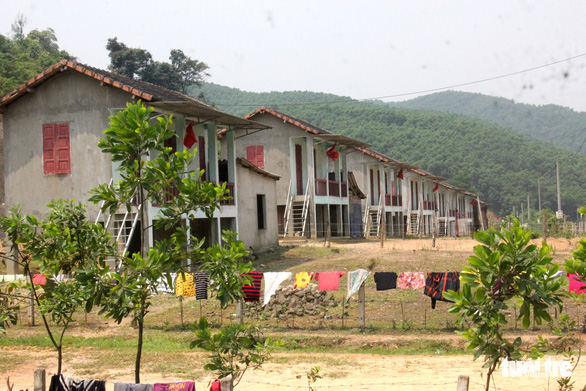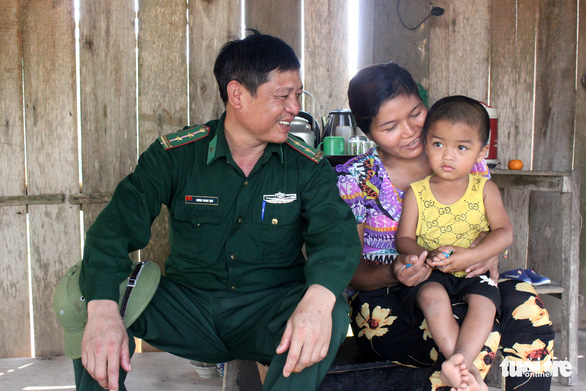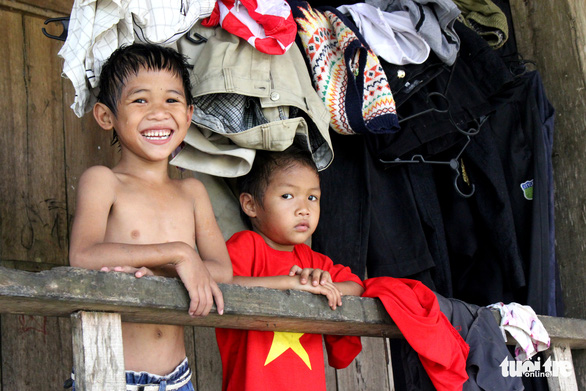Nearly 150 Chut ethnic minority people have dwelled at the foot of Mount Ka Day in Ha Tinh Province, Vietnam for the last 30 years, having their journey to modern life aided by dedicated border defense military officers.
It is a 20-kilometer winding route from the center of Huong Khe District to Rao Tre Village in Huong Lien District, where the Chut reside.
Duong Thanh Tinh, a border defense military lieutenant in Ha Tinh Province working in Rao Tre Village, pointed at a group of brisk walkers with baskets on their backs.
“The Chut people have changed a lot," he said.
"Now they know how to exchange wood for rice and do not barter buffaloes for wine as they've done before.”
In 1960, 18 members of the Chut minority moved from neighboring Quang Binh Province to the mountainous area of Huong Khe District for their new settlement.
At that time, they were hunter-gatherers living in stone caves.
Noticing their existence, the border defense military approached and encouraged their resettlement to Giang Village in Huong Lam Commune.
The ethnic group found this new area an unfamiliar setting and deserted it for their sacred mountainous grounds.
Some 30 years after that, a small village site was established at the foot of Mount Kaday by Ha Tinh authorities.
Coming to their new home, the Chut then had their own territory and took lessons on literacy and business from the military officers.
According to Lieutenant Tinh, the Chut have no names and keep no records of their ages.
For their Vietnamese citizenship identity cards, it was guesswork for the military officers to give each of them an age and name.
|
|
| The military officers frequently visit the Chut people and offer them help in Ha Tinh Province, Vietnam. Photo: Le Minh / Tuoi Tre |
Two men carrying palm leaves were seen on the way to the village. They were about to build a chicken shed.
“I can’t remember my age. Ask the soldiers then,” one of them, Ho Do, said.
“The only thing I remember is that we learned how to build houses and find food from the army.
"We go to them for medicine, too."
To the Chut people, a witch doctor is highly revered.
He is considered a devil punisher who can drive away demons and heal the sick through offerings to the gods.
Several of their deep-rooted practices have remained despite their breakaway from the caveman life.
Some of the stories give the military officers goosebumps.
An example is their wedding proposal ritual. A man simply needs to place a bunch of wood logs in front of his lover’s house as a sign of a proposal.
Once the girl’s family burns the logs in their kitchen, the man has his wife.
This has resulted in consanguineous marriages in the Chut community.
Also, expectant Chut mothers are required to take care of themselves alone on mountains when the babies are due.
They will give birth by themselves and bathe the newborn in the stream afterwards.
Due to the offspring’s physique, the death rate is rather high.
If a baby survives, he or she is to stay on the mountains with the mother for one month before the two are allowed back home.
Ho Thi Nhan, one such mother, delivered five children all by herself without a single one escaping death.
Her sixth child was delivered at home, but it was a complicated breech birth putting both the mother and child at risk.
The witch doctor could not shoo the devil away. The family believed the forest spirits wanted the child.
The military officers saved them both.
It takes more to help the Chut
The Chut witnessed a big change in life following their inhabitation in the new land.
They have learned agricultural farming and no longer gape in wonder at buffaloes of someone feeding in their rice fields.
|
|
| Children of Chut families have made it to formal education in Ha Tinh Province, Vietnam. Photo: Le Minh / Tuoi Tre |
A lot of old customs have been abandoned. The witch doctor’s power is a thing of the past.
They have got their television sets and motorbikes.
Most noticeably, the inbreeding marriage rate has considerably decreased.
It took the border defense army a great deal of propaganda and encouragement to stop such a genetically destructive practice.
They have even acted as matchmakers and have successfully matched seven Chut members with the Kinh and Ma Lieng people in Ha Tinh and Quang Binh Provinces.
The income of the Chut, however, is unstable as they rely on small-scale farming, manual forest logging, and forest products.
Among the 43 households labeled ‘poverty’ status, according to national standards, only five have made it off the list.
Several of the 150 members of the village have departed for business opportunities faraway.
The imbalance in the male-female ratio of the Chut is alarming as well, according to Lieutenant Tinh.
Out of 16 adults legally eligible for marriage, there are 14 males and merely two females.
It is difficult for Chut men to bond with someone from a different ethnicity. Therefore, the matchmaking efforts by the army men really help prevent weddings of closely-related family members.
“The state should allow them to do forestry work and aid their plantation. More jobs should be created as well,” said Lieutenant Tinh.
“That way, young adults can have a better life and a chance to mix with members of other ethnic villages.
"Then, the Chut as a community will catch up with the rest of Vietnam.”
Like us on Facebook or follow us on Twitter to get the latest news about Vietnam!





















































